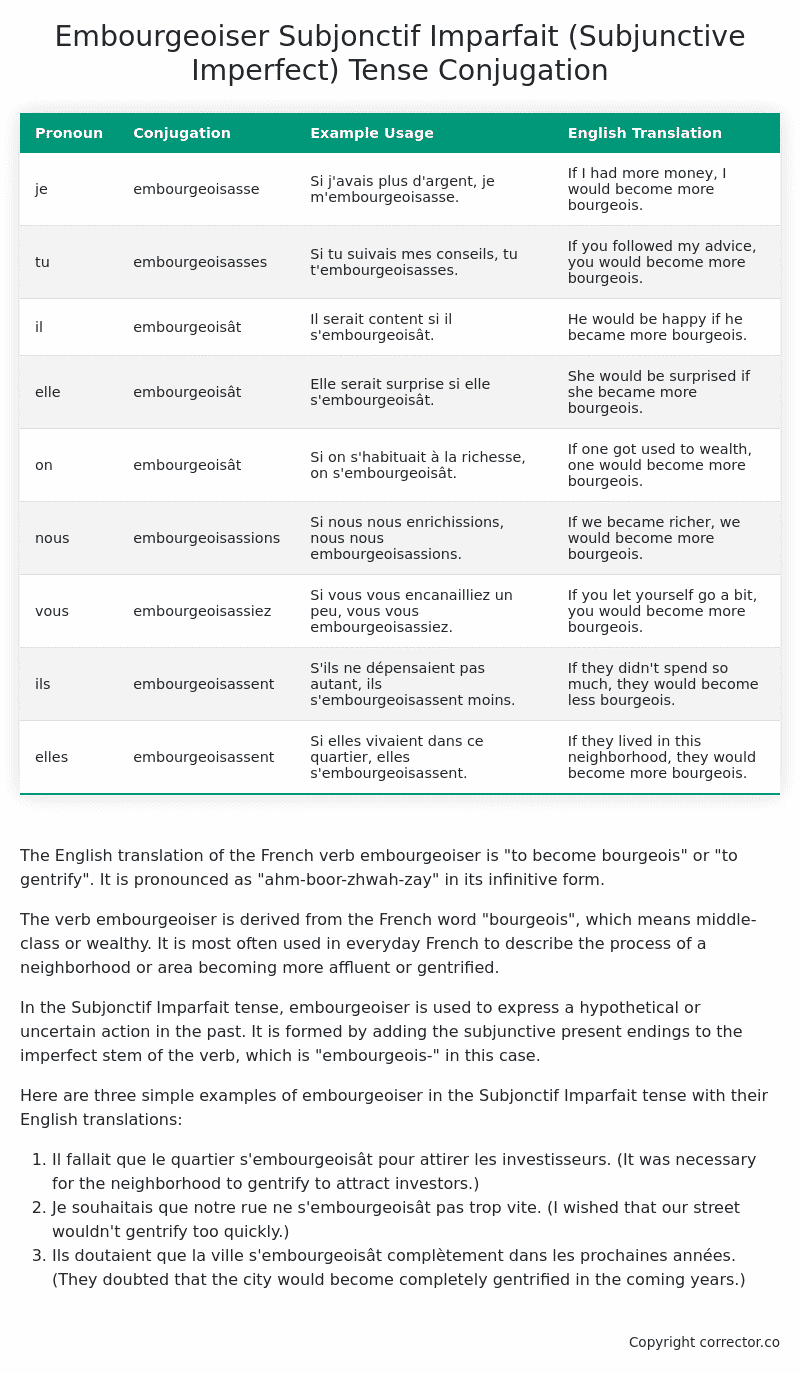Subjonctif Imparfait (Subjunctive Imperfect) Tense Conjugation of the French Verb embourgeoiser
Introduction to the verb embourgeoiser
The English translation of the French verb embourgeoiser is “to become bourgeois” or “to gentrify”. It is pronounced as “ahm-boor-zhwah-zay” in its infinitive form.
The verb embourgeoiser is derived from the French word “bourgeois”, which means middle-class or wealthy. It is most often used in everyday French to describe the process of a neighborhood or area becoming more affluent or gentrified.
In the Subjonctif Imparfait tense, embourgeoiser is used to express a hypothetical or uncertain action in the past. It is formed by adding the subjunctive present endings to the imperfect stem of the verb, which is “embourgeois-” in this case.
Here are three simple examples of embourgeoiser in the Subjonctif Imparfait tense with their English translations:
- Il fallait que le quartier s’embourgeoisât pour attirer les investisseurs. (It was necessary for the neighborhood to gentrify to attract investors.)
- Je souhaitais que notre rue ne s’embourgeoisât pas trop vite. (I wished that our street wouldn’t gentrify too quickly.)
- Ils doutaient que la ville s’embourgeoisât complètement dans les prochaines années. (They doubted that the city would become completely gentrified in the coming years.)
Table of the Subjonctif Imparfait (Subjunctive Imperfect) Tense Conjugation of embourgeoiser
| Pronoun | Conjugation | Example Usage | English Translation |
|---|---|---|---|
| je | embourgeoisasse | Si j’avais plus d’argent, je m’embourgeoisasse. | If I had more money, I would become more bourgeois. |
| tu | embourgeoisasses | Si tu suivais mes conseils, tu t’embourgeoisasses. | If you followed my advice, you would become more bourgeois. |
| il | embourgeoisât | Il serait content si il s’embourgeoisât. | He would be happy if he became more bourgeois. |
| elle | embourgeoisât | Elle serait surprise si elle s’embourgeoisât. | She would be surprised if she became more bourgeois. |
| on | embourgeoisât | Si on s’habituait à la richesse, on s’embourgeoisât. | If one got used to wealth, one would become more bourgeois. |
| nous | embourgeoisassions | Si nous nous enrichissions, nous nous embourgeoisassions. | If we became richer, we would become more bourgeois. |
| vous | embourgeoisassiez | Si vous vous encanailliez un peu, vous vous embourgeoisassiez. | If you let yourself go a bit, you would become more bourgeois. |
| ils | embourgeoisassent | S’ils ne dépensaient pas autant, ils s’embourgeoisassent moins. | If they didn’t spend so much, they would become less bourgeois. |
| elles | embourgeoisassent | Si elles vivaient dans ce quartier, elles s’embourgeoisassent. | If they lived in this neighborhood, they would become more bourgeois. |
Other Conjugations for Embourgeoiser.
Le Present (Present Tense) Conjugation of the French Verb embourgeoiser
Imparfait (Imperfect) Tense Conjugation of the French Verb embourgeoiser
Passé Simple (Simple Past) Tense Conjugation of the French Verb embourgeoiser
Passé Composé (Present Perfect) Tense Conjugation of the French Verb embourgeoiser
Futur Simple (Simple Future) Tense Conjugation of the French Verb embourgeoiser
Futur Proche (Near Future) Tense Conjugation of the French Verb embourgeoiser
Plus-que-parfait (Pluperfect) Tense Conjugation of the French Verb embourgeoiser
Passé Antérieur (Past Anterior) Tense Conjugation of the French Verb embourgeoiser
Futur Antérieur (Future Anterior) Tense Conjugation of the French Verb embourgeoiser
Subjonctif Présent (Subjunctive Present) Tense Conjugation of the French Verb embourgeoiser
Subjonctif Passé (Subjunctive Past) Tense Conjugation of the French Verb embourgeoiser
Subjonctif Imparfait (Subjunctive Imperfect) Tense Conjugation of the French Verb embourgeoiser (this article)
Conditionnel Présent (Conditional Present) Tense Conjugation of the French Verb embourgeoiser
Conditionnel Passé (Conditional Past) Tense Conjugation of the French Verb embourgeoiser
L’impératif Présent (Imperative Present) Tense Conjugation of the French Verb embourgeoiser
L’infinitif Présent (Infinitive Present) Tense Conjugation of the French Verb embourgeoiser
Struggling with French verbs or the language in general? Why not use our free French Grammar Checker – no registration required!
Get a FREE Download Study Sheet of this Conjugation 🔥
Simply right click the image below, click “save image” and get your free reference for the embourgeoiser Subjonctif Imparfait tense conjugation!

Embourgeoiser – About the French Subjonctif Imparfait (Subjunctive Imperfect) Tense
Formation
Common Everyday Usage Patterns
Interactions with Other Tenses
Subjonctif Présent
Indicatif Passé Composé
Conditional
Conditional Perfect
Summary
I hope you enjoyed this article on the verb embourgeoiser. Still in a learning mood? Check out another TOTALLY random French verb conjugation!


